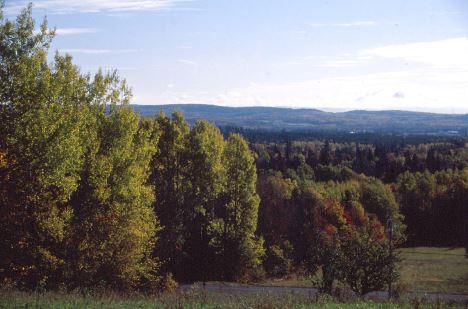the Corporation my father worked for, and later on my own in search of education and of teaching positions, without any settled idea of where to go next, it seems good to have fetched up at last perched on a bit of the Appalachians, those hills which have, one way or another, been a presence in my life, a force, since I was born in the fertile country of the Lehigh Valley east of Pennsylvania's long Blue Mountain.
As a child, I travelled with my parents each summer from Western Pennsylvania where we were living then back to the Lehigh Valley along the Pennsylvania Turnpike, a four lane highway that ran across - and sometimes in tunnels under - the great uplifted ridges of twisted rock. Kittatinny, Tuscarora, Blue Mountain and the rest - there were seven tunnels as I recall, seven times the road disappeared into the heart of rock before emerging, newborn, wreathed in the light, to roll down the miles of another valley and maybe snake through some gap in the next ridge and across another valley before there rose up a hump of rock so stark and strong that the only way over was through. I went away to college in upper New York state, above the Appalachians, but after graduation my first job was teaching English in a boys' school right in the middle of the Pennsylvania hills. On more than one occasion that year - in response to a romance which still, after more than thirty years of marriage and the struggle to raise our children, continues to blossom - I made my way up and down and over those hills, north to the university. I was not driving on a "super" highway now but on little roads that snaked along the valleys, following their long slow curves from south-west to north-east, and watching for a chance to slip over the northerly ridge when there was a break in the upthrust rock. Love conquers all, they say, and in that case it even conquered a strong tendency on the part of geography and the highway department to ignore upper New York state. The romance flourished but the boys' school did not and after another year back at the university to get an M.A. I crossed the Appalachians yet again, this time to take up a teaching position in tidewater Virginia, crossing the mountains again in the late Fall of that year for a wedding ceremony. The Shenandoah mountains westward in Virginia drew us from the steamy summers along the Chesapeake Bay. They have their own name, the Shenandoahs, but they are just another part of that same Appalachian chain that stood as a barrier between the Atlantic seaboard and the interior of the continent in colonial times. Not too far from where I was born the Delaware Water Gap, and Wind Gap a bit further north, were early doorways to the West, and some years after we left Virginia, making a trip to the southern Appalachians, we stood above the Cumberland Gap, the most important pathway through the mountains to the settlement of the west, immortalized in a wonderful banjo tune as the Shenandoahs are immortalized in a haunting sea-shanty. If there is an earthly paradise of the mind for me I think it is a memory of the Shenandoah Valley as we once saw it of an evening from a lookout on the Skyline Drive high up above it. It reminds me of Felix Warren's words, written after he and Daniel Boone had cut the first road through the Cumberland Gap: "We began to discover the pleasing and rapturous aspect of the plains of Kentucky - this was the promised land." From Virginia at last we crossed the mountains northward yet again, this time as a family of three, to settle for many years in Toronto. Clearly, though, the Appalachians still exercised their charm even though I was unaware. Years later, without any conscious intention, a bit of worn-down old mountainside, a bit of what the geologists call "Pennsylvanian" shale - this farm - became our home. Oh, I grumble at all the rock that shows up when I want to dig a bit of garden or plow up a bit of field. Caught here between the mountain behind us and the stream below us, I think wistfully of that topsoil of the Lehigh Valley in Pennsylvania, twelve or more feet deep, without a stone. Yet even as I grumble, the bones that support me, that organize me, that anchor the muscles with which I work the land, those bones recognize kin in all the rocks. Rock opposes rock, then - works against and with rock. So be it. And when at last my flesh melts away and only bone remains, may it be left to join the old bones of these hills. |
Words & ImagesWe moved to our farm in Sussex, New Brunswick from Toronto in 1977, only moving away in 2014. Archives
April 2020
Categories
All
|

